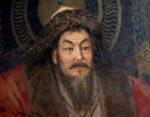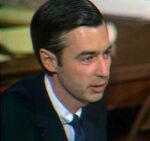He was the quiet, efficient and oh so ruthless architect of the Holocaust; Hitler’s most loyal sycophant. He ruthlessly dispatched those who stood in his way as he rose to a position of power that was second only to the Fuhrer. In the end he spectacularly betrayed his master – only to be felled by his own hand.
In this week’s Biographics, we reveal the cold, calculating life and death of Heinrich Himmler.
Early Years
Heinrich Luitpold Himmler was born on October 7th, 1900 at Wittelsbacherstrasse 2 in Munich. He was the second of three sons to Gebhart and Anna-Marie Himmler. Gebhart was the deputy headmaster of Landshut High School and was a pious, pedantic man.
The family was well-off but not rich and they held a measure of prestige in the local community. Gebhart had previously been a tutor to the royal Wittelsbach Princes. It was this connection that led to the great honor of having Prince Heinrich of Bavaria as Heinrich’s godfather.

Heinrich was not a well child. He was often absent from school with one illness or another. Still, he made up for the absences by simply working harder. By doing so, he proved himself to be excellent student. A middle school teacher remembered him as ‘a very keen pupil whose tireless application, burning ambition and active participation in class have achieved excellent results.’
The man who would go on to persecute the Catholic clergy without mercy, grew up as part of a devout family of believers. As a youth he wrote in his diary . . .
I will always love God and remain true to the Church.
As a teenager, Heinrich served as an altar boy. When war broke out, he developed a desire to serve his country in a military capacity. Gebhart, a fervent nationalist, approved and tried to use his royal contact to smooth his son’s path to becoming an officer. However, the seventeen-year-old was turned down by the Imperial Navy due to his short-sightedness. He next turned to the army, gaining entry and being sent to officer training school. But before he had completed his cadetship, the war was over. Unlike the Fuhrer he would come to adore, Himmler saw none of the carnage of the Great War first hand.
The Emerging Nazi
In April, 1919, Himmler joined one of the many Freikorps army units that were determined to crush the Communist movement. During the next two years he served in various paramilitary organizations that were on the march against democracy, the shameful Treaty of Versailles and the Marxist dictatorship. Young Himmler had been frustrated that he had not got to fight in the front lines during the war and, lacking any direction, he now sought a cause that he could embrace and a leader that he could respect.
Himmler’s family had not been inherently anti-Semitic. In his early twenties, however, he began reading the Jew bashing pamphlets that were circulating around Munich. He also got a hold of the ‘Protocols of the Elders of Zion’, a faked document that purported to contain details of a Jewish world conspiracy.
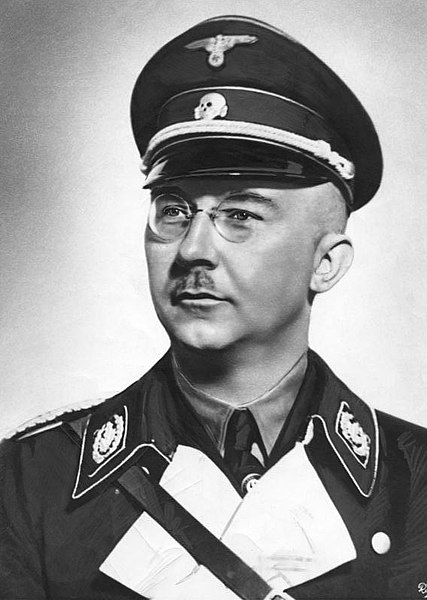
Himmler came of age at a time when the old order was in a state of chaos. The German people were defeated, their economy decimated and their psyche damaged irreparably. This caused fear and depression. In the old order, Himmler, the son of a royal tutor, would have found a secure place in society. But now all bets were off. He would have to forge his own path.
Gerhard Himmler had instilled in his sons the Teutonic ideal that the German Aryan was the master human being. What Heinrich saw on the streets of Munich in the early ‘20’s was the opposite of Aryan supremacy – the people were fast sliding into decadence and immorality. But this was no fault of the German people – his readings convinced Himmler that the country’s ills could all be laid at the feet of one group – the Jews.
Himmler would spend the rest of his life championing the Teutonic ideal. His constant refrain when faced with a situation was, ‘What would our forefathers have done in this situation?’
Disgusted at what had happened to his beloved German nation, the young Himmler began making plan to emigrate. On November 23rd, 1921 he wrote the following in his diary . . .
Today I cut an article from the newspaper about emigration to Peru. Where will I end up: Spain, Turkey, the Baltic countries, Russia, Peru? I often think about it. In two years’ time I will no longer be in Germany.
A year later he was still in Germany, but the dream of living abroad was still with him. In 1922 he enquired at the Soviet Embassy about moving to the Ukraine as an estate manager. Two decades later he would send his death squads into the Ukraine to decimate the land and wipe out its Jewish inhabitants, but for now his greatest ambition was to be a peaceful agricultural manager.
By the end of 1922, Himmler had completed a degree in agriculture and settled into a job as an agricultural assistant in a fertilizer factory. Then, in 1923, he joined the Nationalist Socialist Worker’s Party. He started off as a member of the paramilitary unit under Ernst Rohm and played a part in the unsuccessful Beer Hall Putsch attempt to seize power. The police threw several people, including Hitler himself, in prison. Himmler was questioned but then released through lack of evidence. But his involvement in the attempted revolt led to him losing his job as an agricultural analyst. With no money coming in, he had to move back in with his parents.
Around this time, Himmler appears to have fallen into a depressive state. He had few friends and portrayed an aggressive, volcanic personality. The Catholic religion, which had been so dear to him, was abandoned and a fascination with the occult began to take shape.
Unlike a lot of other new recruits to the Nazi party, Himmler was not immediately overawed by the presence of Adolf Hitler. His adoration of the Fuhrer developed over time. As was his nature, Himmler read everything he could about and by Hitler. He came to appreciate him first on an intellectual level – the worship would come soon enough.
The Loyal Worker
The now unemployed twenty-five-year-old began putting all of his energies into the cause of national socialism. He took on the position of secretary for Gregor Strasser, a pharmacist from Landshut who was standing as a candidate for the Reichstag. In return for a monthly salary of 120 Reichsmarks he traveled around Lower Bavaria on his motorcycle and gave inflammatory speeches against Jews and Communists. Strasser was a Nazi party member who was attempting to wrest control of the organization from the imprisoned Hitler. Believing that he would succeed, Himmler supported Strasser in this internal power struggle.
In the early ‘20’s the notoriously shy Heinrich, found his fraulien – a nurse from Bromberg named Marga. Tall blond and blue-eyed, she fit the Teutonic ideal and matched Himmler’s ideal image of Germanic womanhood. The couple were married on July 3rd, 1928 with Marga bringing a sizable dowry to the union. This financial windfall enabled Heinrich to realize his dream of owning his own piece of land and they purchased a chicken farm at Wadltrudering not far from Munich.
During this time, Himmler managed to rise rapidly in his standing within the party. By 1926 he was deputy head of Reich propaganda and then deputy Reichsfuhrer-SS. By then Hitler had been released from prison, brushed aside the internal threat from Strasser and published his tome, Mein Kampf. Himmler effortlessly switched his allegiance back to Hitler. He devoured Mein Kampf, commenting that it contained an extraordinary number of truths. Very quickly, Himmler’s loyalty to Hitler became absolute.
The SS
By the mid-1920’s Hitler came to the realization that he was in need of a special protection force. He needed a squad of men who gave him unquestioned loyalty and were even prepared to march against their brothers if needed. To head such a force no one was as fervently devoted and therefore so eminently suited as Heinrich Himmler.
On January 6th, 1929, Hitler appointed Himmler to the position of Reichsfuhrer-SS. At that time, the SS was a small division of the larger SA, which was under the headship of Ernst Rohm. The SA was Hitler’s private army. The fighting quality of its men was questionable, but Rohm saw its strength coming from force of numbers. In contrast, the SS was a far more elite force. Its members wore black peaked caps emblazoned with a skull along with black bordered swastika armbands.

The new position was ideal for Himmler. From his youth he had admired and been fascinated by the Praetorian Guard that were the elite protection force of Roman emperors. Now he had the opportunity to craft his own modern day Praetorian Guard. He immediately began putting his own stamp on the SS. He had belt buckles made that were in scripted with the words . . .
SS man, loyalty is thy honor.
He also came up with a succinct motto for his men . . .
Be more than you seem.
When Himmler assumed leadership, the SS numbered around 200 men. A year later it had grown to just over a thousand. By June, 1934 it had swollen to 50,000. In 1931, Himmler created a unit within the unit. It was called 1C and was put under the leadership of new rising star Reinhard Heydrich. Later to become the secret service, this was the organ by which Hitler could have undercover surveillance undertaken within the party.
Night of the Long Knives
By 1934, the SA under Ernst Rohm had become redundant to Hitler. Now that he was Chancellor he had no need for a bunch of street thugs. In fact, his association with them was bound to be damaging to his career. It was time to break this private army up. Himmler was delighted with the news that the SA, along with its commander Ernst Rohm, were about to be dealt with. For five years he had been a subordinate to the uncouth and unorganized Rohm, whom he considered his social inferior.
Himmler threw himself into planning the overthrow of the SA that history would recall as the Night of the Long Knives. Documents were forged to show that the SA were planning a coup and Himmler personally took those documents to Hitler. Immediately death lists were drawn up containing the names of SA leaders as well any others who were seen by Himmler and Heydrich as threats to their growing power. At the top of the list was Ernst Rohm.
When Rohm was taken into custody, Hitler was in favor of commuting the death sentence of his long-term colleague but he was brow beaten by Himmler and Heydrich into eliminating him. This was in calling with Himmler’s underlying nature. He was a man who was completely devoid of scruples, lacking any of the normal inhibitions or pangs of conscience that would cause others to pause in their actions.
The arrests, torment and murders of the Night of the Long Knives were carried out by Himmler’s SS. Their leader was a major beneficiary of the operation. In the wake of the purging of the SA, Himmler took over headship of the Gestapo from Hermann Goering. Around the same time, Himmler ordered the death of Gerhard Strasser the man he had earlier supported as Nazi Party leader and who had been his employer.
Total Power
By 1935, Himmler was in a position of great power within the Nazi state. As well as heading the SS and Gestapo, he was also in command of the entire German police force. This enabled him to participate in Cabinet meetings with all the rights and privileges of a minister of the Reich.
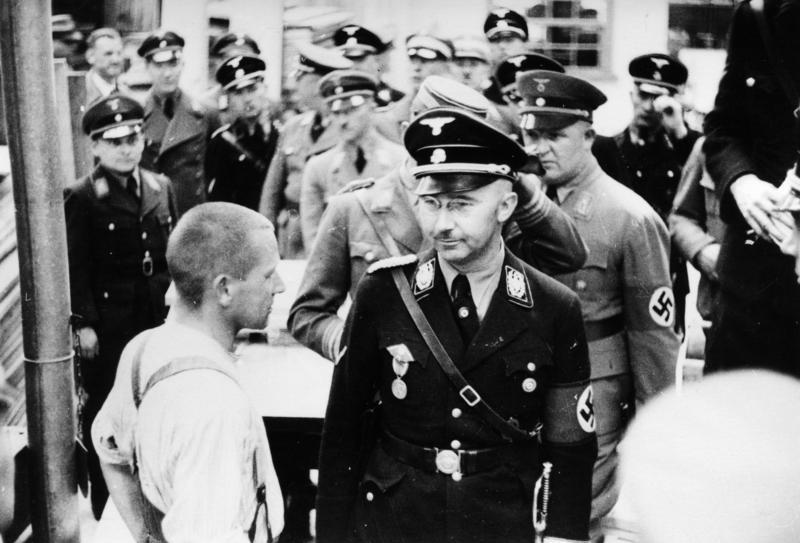
On October 11th, 1936, Himmler gave a speech in front of the academy of German Law in which he made it clear how he was to run the country’s police and defense forces . . .
Whether or not our actions conflict with a particular article or sub-section is a matter of complete indifference to me. In the fulfilment of my duty, I do precisely what I can answer for in my work for Fuhrer and nation, and what equates with healthy common sense. Whether or not others whined about a breach of the law is no concern to me.
Hitler would only accept the very best Teutonic men into the SS. The organization was to be a racial elite class. Himmler made sure that he saw a photo of every applicant. He meticulously scanned them in search of anything that might give evidence of impurity. Once he found his perfect specimens, he intended to do what he could to ensure that there were more of them. And so, on October 28th, 1939, he issued his procreation order to the SS. It was the highest duty of women and girls to conceive children by the soldiers of the SS before they went into battle. In other words, if a female did not submit to the sexual demands of an SS man, she was guilty of treason to the state.
Himmler became obsessed with the idea of procreating the world with Pure Aryans. An order went out that every SS man was to father at least one child. He considered monogamy to be a sin. His men were allowed to have several wives in order to be able to father as many future heroes as possible.
Mass Murder
Under Himmler, the SS became much more than a personal bodyguard for the Fuhrer. Himmler had been charged with restoring the nation to health. This task required ridding the country of racial impurity. To do this the SS would go through community after community and cleanse it of Jews, Freemasons and Jesuits. But Himmler had soon extended the list of undesirables to include Slavs, gypsies, homosexuals, Jehovah’s Witnesses and Communists.
When Hitler invaded Russia in 1941, Himmler provided ‘action squads’ who would follow up the regular army as it conquered the land. Their job was to take out all Jews, Asiatics, Communist and gypsies. Himmler ensured that his men keep meticulous records of their activities. One of the squad commanders had recorded 90,000 killings in just the last few months of 1941.

These mass scale murders, however, presented a problem that Himmler had to provide a solution for. Having to kill so many people each day was proving challenging for the psyches of the soldiers doing the work. Was there a more efficient way to kill that did not lead to such demoralization?
Of course, there was no question in Himmler’s mind that the course of mass murder was morally, socially and politically correct. For year he had drilled two simple rules into the minds of his SS . . .
Firstly, the Fuhrer was always right.
Secondly, the end justifies the means.
He presented the mass extermination as a monumental secular mission that his men were privileged to be fulfilling. After personally watching the execution of 200 Jews near Minsk, he said . . .
It is the curse of the great man to step over corpses.
In the summer of 1941, Himmler summoned the commandant of the Auschwitz Concentration Camp, Rudolf Hoss to a meeting in Berlin. He informed him that the Fuhrer had order the final solution to the Jewish question. The SS, he told Hoss, were to carry that order out and he had selected Auschwitz as the prime location to do it. Hoss and Adolf Eichmann were to organize the genocide but Himmler was the man in charge.
Under Himmler’s watchful gaze the concentration camps, with Auschwitz as the shining model, became incredibly efficient death factories. Those passing through the gates of the camp were weeded, with those selected going directly to the gas chambers. In less than fifteen minutes they were dead, victims of the highly poisonous gas Zyklon B. For those who were considered fit for work, their death would come from exhaustion or starvation.
Himmler paid a personal visit to Auschwitz in 1942. He watched as victims were selected and watched through a spyhole in the gas chamber door as the executions were carried out. He did not comment on what he saw, a sign to camp commandant Hoss that he was happy with what he witnessed. Himmler went on to inspect the rest of the camp, during which time Hoss campaigned about the squalid conditions and the dangers of disease to his men. Himmler stopped him in mid-sentence and declared . . .
I don’t want to hear anymore about your difficulties. For an SS officer there are no difficulties; his duty is always to remove difficulties himself as soon as they arise. How you do it is for you to figure out, not me.
End of the Reich
By mid-1944, the tide of war had turned and the writing was on the wall for the Nazi regime. Yet, Himmler’s unwavering loyalty to Adolf Hitler was intact. This, being the case, historians have noted that it seems odd that, with his massive spy network he did not have advanced warning of the July 20th, 1944 plot to kill Hitler. Some have even speculated that he was involved in some way. It is true that three days before the attack he turned down a written Gestapo request for permission to arrest two of the main plotters. It is also clear that the ruthlessness with which the SS persecution machine when into action after the attack was not matched with its usually impeccable standard of surveillance before it.
It is probable that Himmler did not intend to betray Hitler on July 20th, 1944. But that betrayal was to come, and it would manifest itself on the Fuhrer’s birthday, April 20th, 1945. On that day, Himmler was guest along with other high-ranking Nazis at what must surely have been one of the most macabre birthday parties in history. It was held in the underground bunker that was Hitler’s final hideout, situated in the heart of ravaged Berlin.

Hitler was unaware that Himmler had a second engagement later that day; with an emissary from the World Congress of Jewry. He proposed that the Jews and the National Socialists bury the hatchet and that concentration camps inmates would be handed over to the Red Cross. Just a few days earlier he had given orders that no camp survivors were to fall into enemy hands and no camps were to be surrendered. His about face was clearly a matter of expediency in an attempt to minimize the ire of the allies when they discovered the horrors that had been taking place under his watch.
Three days later, Himmler held talks with the Swedish diplomat, Count Folke Bernadotte. Here he presented a surprising offer, saying that, in order to save Germans from the full force of a Russian invasion he was prepared to surrender the Western front – but not the Eastern front. Himmler believed that he could negotiate directly with President Eisenhower and wondered out loud whether he should shake the President’s hand or offer him a Nazi salute.
Of course, Himmler’s clandestine visits were meant to be top secret. However, somehow, they got leaked to the media and on April 28th, London’s BBC broadcast that Himmler was claiming that Hitler was dead and that he was his successor. In the Berlin bunker, Hitler’s adjutants were monitoring the airwaves and this news soon found its way to the Fuhrer.
Hitler was dumbstruck. He could accept betrayal from anyone else, but never from his loyal Himmler. He called it the most monstrous betrayal in world history and he immediately ordered Himmler’s arrest. But within days, Hitler was dead, the victim of his own hand.
An Inauspicious End
On May 1st, Himmler met with Hitler’s heir, Admiral Karl Donitz at the naval barracks at Plon. Donitz was wary. Even though Himmler had been deposed, there was no telling how much allegiance the men of the SS would still give to him. Himmler was shown his letter of dismissal. Ignoring it he congratulated Donitz on his appointment and offered to work with him as his second-in-command. Donitz declined. The meeting was over and Himmler was allowed to walk away.
He now resolved to go into hiding and bide his time before coming back to lead his all-powerful SS on a surge to power. On May 22nd, with the war over and Germany under allied occupation, a British patrol stopped a group of ragged looking men outside of Hamburg. One of them, a short, thin man with a black eye patch told them his name was Heinrich Hitzinger and then produced forged identity papers. He was dressed as an ordinary German soldier. The seven men were, in fact, Himmler, his bodyguard and adjutants.
The British guards took the group into custody and placed them in a prisoner of war camp just out of Bremen. It didn’t take long for the proud Himmler to chafe under the common treatment that he was receiving as merely a captured soldier. After a few days he requested an audience with the camp commander.
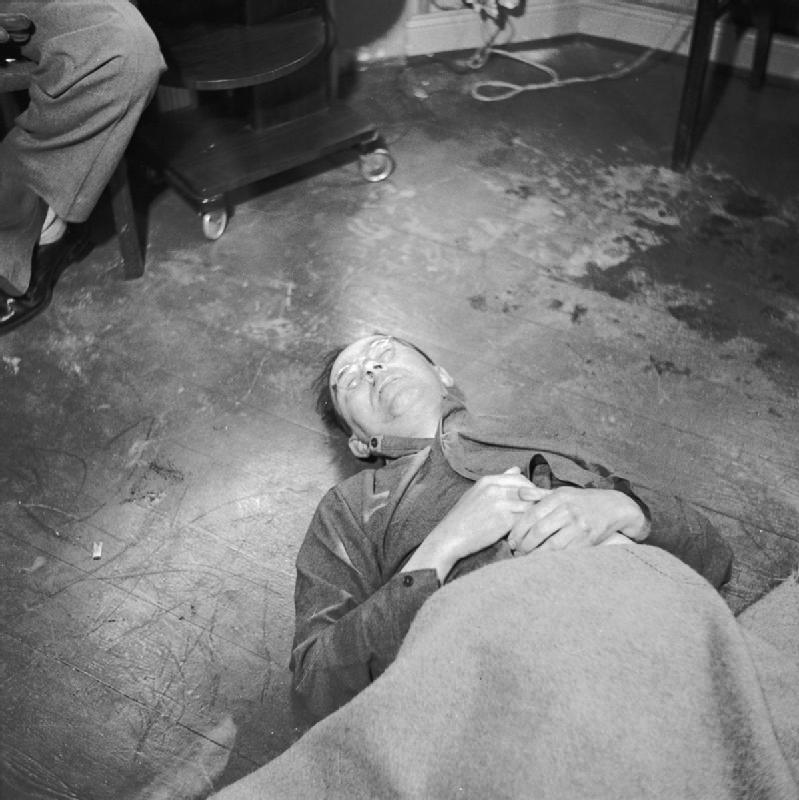
Expecting to be treated with newfound dignity, Himmler announced his true identity. But rather than being respected for his position as the Nazi number two man, his captors treated him with contempt. He was forced to strip completely and kept under 24-hour watch to prevent his suicide.
The following day Himmler was brought before the camp commander for interrogation. In his mouth he had secreted an ampoule of poison which had been issued to all top Nazis and which they always carried with them. A body search was ordered and when a doctor tried to examine Himmler’s mouth, he bit down on the ampule. The enraged British tried desperately to clear the poison from his system. But it was no good. Within twelve minutes, Himmler was dead.


